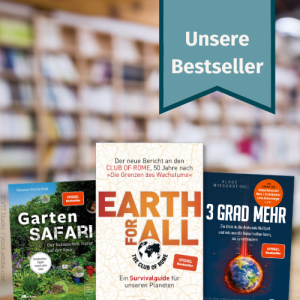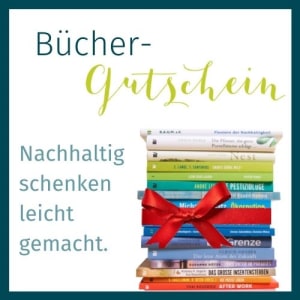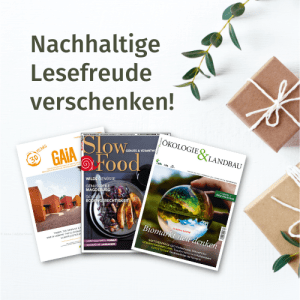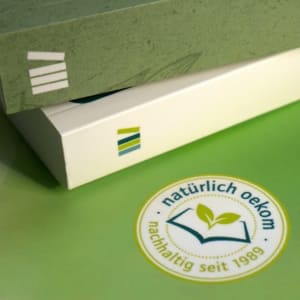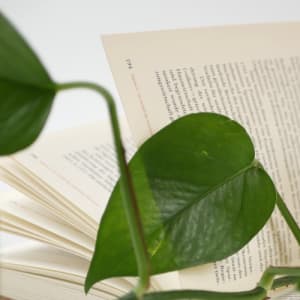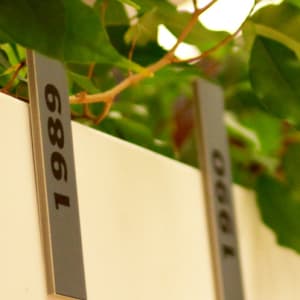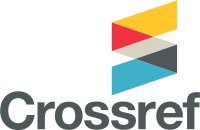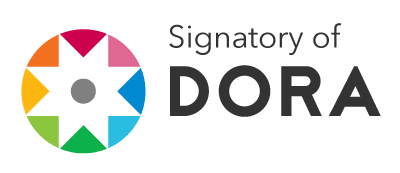Our values
oekom is independent and not geared towards maximizing profits. We are committed to sustainable corporate management and production, ethical publishing and place high demands on the quality of our products and services.
We are independent
In 1989, Jacob Radloff founded oekom verlag, which he still heads as publisher and CEO.
As one of a small number of publishers and against all trends, oekom is independent and autonomous. Independence from profit-oriented investors is ensured - in addition to the publisher - by a group of shareholders consisting of ecologically motivated and committed individuals and organizations.
We are not profit-oriented
With our thematic focus on environmental and sustainability issues, we at oekom operate in a niche that sets a tight financial framework. We have accepted this challenge by subordinating profit maximisation to social and environmental sustainability, while creating economic stability for the company and its employees. We select the books and journals we publish primarily on the basis of whether they meet our objectives: to promote the transformation of society towards greater sustainability, to support research for sustainable development, and to serve the exchange of ideas on how we can preserve our livelihoods.
We develop oekom science's activities with the aim of meeting the needs of researchers and supporting the scientific community. We do not seek to generate surpluses for distribution to shareholders. Any surpluses are either ploughed back into the business or used to support charitable activities. These include our own initiatives, such as the non-profit organisation oekom e. V., the activities of our Sustainability Office (e. g. the project »Sustainable Publishing. New Standards for the Publishing Industry«), the organisation of the GAIA Masters Student Paper Award, or campaigns such as the provision of free content for the 26th UN Climate Change Conference.
To live up to our values, we consciously accept additional costs: For example, by committing to printing in Germany, using recycled paper and petroleum-free inks, offsetting unavoidable emissions, travelling without cars or planes, and making everyday office life greener.
We publish sustainably
At oekom, everything revolves around sustainability: We are the largest publisher for the topics of environment and sustainability in the German-speaking world – and we are pioneers in the publishing industry when it comes to corporate sustainability and green publishing.
For oekom, ecology and sustainability are not just words on paper; they form the foundation of our corporate philosophy. Cooperation instead of egoism, environmentally friendly production instead of maximum sales figures, diversity instead of monotony: We want to highlight alternatives with our publications and be an alternative ourselves.
And word has spread in the meantime: The company's expertise with respect to sustainable management practices and green publishing is well known within the publishing branche and beyond.
Sustainability aspects at oekom
Sustainability aspects play a significant role in corporate governance, in all management decisions and along the entire value chain. In production and sales, procurement and everyday office life, the publishing house consistently relies on products and processes that have the least possible impact on the environment. To this end, we consciously accept additional costs despite a difficult market environment.
oekom is a multiplier of the sustainability concept. Back in 2010, the publishing house initiated the project »Sustainable Publishing - New Environmental Standards for the Publishing Industry« together with the Frankfurt Book Fair, which was supported by the German Federal Ministry for the Environment and which led, among other things, to the development of the Blue Angel eco-label for printed products (ZU 195). Since then, oekom has been a sought-after discussion partner on the topics of corporate sustainability and green publishing - with other publishers, printers, as well as in industry media and at relevant events.
The publishing house reports on its own sustainability performance, among other things, in the Declaration of Conformity with the German Sustainability Code (an update is currently being prepared).
Climate impacts
oekom takes far-reaching measures to avoid CO2 emissions in all business areas. As a result, oekom's emissions are around 25 percent lower than those of a publishing house of comparable size.
Over 90 % of oekom publications are printed on recycled paper. According to the Federal Environment Agency, the use of recycled paper not only reduces the burden on forests as a source of raw materials; its production also requires up to 60 percent less energy than virgin fiber paper.
In order to keep transport distances to a minimum, oekom works with regional service providers wherever possible in the production and distribution of print products, but always with service providers from Germany.
Various printing companies that produce for oekom are certified with the Blue Angel for printed products (RAL UZ-195) and have reduced their climate-damaging emissions to a minimum in accordance with the award criteria.
The publishing house takes further climate protection measures by purchasing certified green electricity for its publishing premises (since 2008). To keep climate-damaging emissions from travel to a minimum, all business trips - including those over 500 km - are made exclusively by rail.
The publishing house has been offsetting unavoidable emissions since 2008 by investing in a Gold Standard project to protect the climate and biodiversity.
Resource conservation
Recycled paper certified with the Blue Angel has a particularly high proportion of waste paper. As mentioned, over 90% of oekom publications are printed on recycled paper, and over 85% on Blue Angel recycled paper.
The use of recycled paper not only protects the climate by reducing deforestation. It also preserves valuable habitat and protects biodiversity. In addition, the amount of water required to produce recycled paper is up to 70% less than that required to produce virgin fiber paper. Print products that have been awarded the Blue Angel also have a high level of recyclability.
In the case of print shops certified with the Blue Angel for print products (RAL UZ-195), raw materials, auxiliaries and operating materials come from renewable raw materials in accordance with the award criteria.
Most of oekom's publications are also available digitally. Since the ecological footprint of digital media depends very much on individual user behavior, oekom provides extensive information on its website to encourage customers to behave in the most environmentally friendly way possible.
In the office, a procurement guideline ensures that the equipment is as resource-friendly as possible; coffee and tea, office supplies and cleaning agents, etc. are subject to the highest standards of sustainability.
Effects of pollutants on the environment
Recycled papers certified with the Blue Angel do not contain any input substances and materials that are harmful to the environment and health. The printing inks used for oekom's publications are free of mineral oil; the latter is suspected of having carcinogenic or mutagenic effects and pollutes the climate and environment during extraction, processing and consumption. The publisher takes the utmost care to ensure that the vegetable oil-based inks used come from certified cultivation, in order to avoid destroying forests and using genetically modified organisms (GMOs). In this way, oekom supports the demand of the Federal Environment Agency and the Federal Office for Risk Assessment for the development of alternative printing inks.
In accordance with the award criteria, printing companies certified with the Blue Angel for printed products (RAL UZ-195) have reduced to a minimum the use of substances that are hazardous to the environment and health. As oekom works exclusively with German printers, German environmental legislation always applies.
Societal effects
Flat hierarchies and transparency enable employees to have a say in all areas. A good work-life balance is ensured through flexitime, annual working time accounts and working from home - even before the corona pandemic. Free organic tea and coffee, free yoga classes for employees, and ergonomic office furniture are part of the company's health care program and reflect its corporate values. A works council looks after social issues within the company. Occupational health and safety at suppliers and service providers is guaranteed by German legislation. In addition, the Blue Angel eco-label guarantees respect for human rights in the relevant paper mills.
We support the SDGs
As a signatory of the SDG Publishers Compact, oekom is committed to developing and implementing sustainable practices and acting as a supporter of the Sustainable Development Goals (SDGs) during the Decade of Action to 2030 (and beyond, of course).
The authors of our scientific journals and reference books publish almost exclusively information, analyses and recommendations for action that can contribute to the achievement of the SDGs. Particularly frequent are contributions to the following Goals
- 7 "Affordable and clean energy"
- 9 "Industries, innovation and infrastructure"
- 11 "Sustainable cities and communities"
- 12 "Responsible consumption and production"
- 13 "Climate action"
- 14 "Life below water"
- 15 "Life on land".
In accordance with the recommendations of the SDG Publishers Compact, oekom plans, among other things, to work together with the editorial boards of the scientific journals to develop journal-specific measures that serve to achieve the SDGs.
At the corporate level, oekom is also addressing the 17 SDGs, focusing on Goal 4 "Quality education", Goal 8 "Decent work and economic growth", Goal 12 "Responsible consumption and production", Goal 13 "Climate action", and Goal 15 "Life on land" - here, the protection of biodiversity is our main focus.
We are committed to research integrity
As a scholarly publisher, we are committed to research integrity, academic freedom and scientific excellence, as well as to maximising access to research results.
We support researchers and editors in their efforts and commitment to uphold the rules of good scientific practice.
Publication Ethics
In order to ensure this, the journals GAIA, TATuP, and Raumforschung und Raumordnung | Spatial Research and Planning have published Publication Ethics Statements. These statements outline the codes of conduct for editorial and scientific advisory board members, the editorial office, authors, peer reviewers and the publishing house. They present policies on authorship, on intellectual property, on handling competing interests as well as complaints and appeals. They describe options for post-publication discussions and corrections as well as processes for identification of and dealing with allegations of research misconduct. Journal policies support and are consistent with the Core Practices developed by the Committee on Publication Ethics (COPE).
Plagiarism Checking
For our authors, we offer assistance in avoiding accidental plagiarism. We offer advice and a free plagiarism check (Similarity Check powered by iThenticate).
Support of Recognized Initiatives
oekom is a member of Crossref, a not-for-profit membership organization that makes research outputs easy to find cite, link, assess, and reuse. They provide a range of services to members such as to register content and assign persistent identifiers (DOI, Digital Object Identifiers) to books and journal articles, or to provide members with a user-friendly tool to detect plagiarism (Similarity Check / iThenticate).
oekom is a signatory of The Declaration on Research Assessment (DORA). We share DORA’s goal of improving the evaluation of scientific research results.
We value quality and personal contact
You have invested a lot in the elaboration, evaluation, interpretation and presentation of your research results. We invest a lot to give your research an appropriate environment: We attach importance to the design of our products, to customized services, flexibility and personal contact.



